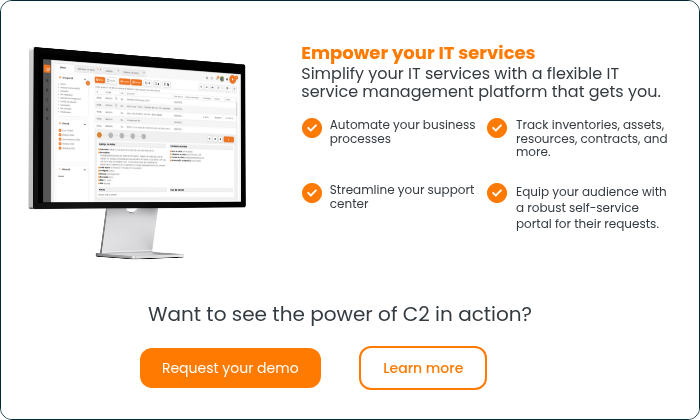A brief history of ITIL
The UK government first developed ITIL in the 1980s to standardize how early generations of information technology were used in government agencies. The benefits of such a standardized framework soon became apparent to many in the private sector and ITIL rapidly expanded over the ensuing decades.
ITIL has undergone multiple iterations since then. The pace of change came quickly in the 2000s and 2010s in response to the rapidly changing ecosystem of Internet and cloud technology available to businesses—the most recent version, ITIL 4 was released in 2019.
The ITIL service lifecycle: ITIL’s core processes
ITIL has five main stages: Service strategy, service design, service transition, service operations, and continuous service improvement. These cover an IT service’s entire lifecycle within your organization.
Service Strategy
As the name implies, the strategy stage focuses on identifying your organization's strategy to bring a particular service to market. Activities can include market research to determine what potential customers want, analyzing their specific needs, building customer profiles, and assessing your organization’s capabilities to deliver this proposed service.
Service Design
The next stage is where you design a new service or update an existing one according to your defined strategy. Everything in and around your new service must be designed, including its software and hardware architecture, the transition plan you will follow and the service level agreements (SLAs) you will have with your customers.
Service Transition
Your teams will build and deploy all the components you identified during service design in the service transition stage. In addition, your team will employ agreed-upon standardized processes for changing services and business systems to minimize downtime and interruption of your existing services.
Service Operations
Your organization’s work isn’t done once you’ve successfully deployed a service. One of the key tenets of ITIL is that “success” is defined as how consistently you continue to deliver a service over its lifecycle. The service operations stage focuses on the day-to-day management activities you need to perform to achieve that goal. Those include responding to incidents, documenting important service issues and minimizing all disruptions to business operations.
Continual Service Improvement (CSI)
As the business adage goes, “If you’re standing still, you’re falling behind.” Continual service improvement focuses on analyzing data about the successes and failures encountered throughout your service lifecycle to improve. The goal is to enhance the overall quality and value of your IT services over time.
What are the benefits of ITIL?
What sometimes needs to be clarified for people new to ITIL is that it does not include technology or organization-specific guidance. Unfortunately, that can turn some people away before they understand the full benefits of ITIL, of which there are many.
Improve customer satisfaction
As with all ITSM frameworks, ITIL focuses on delivering value to customers through services. That requires a deep understanding of customer needs and encourages practicing organizations to structure their processes around what matters most to their customers.
Foster business alignment
Also baked into ITIL is aligning IT services with broader business goals. You only ever want to design a service that your strategic analysis reveals will further those goals. Individuals who choose to get ITIL certified will learn how ITIL's service strategy and design principles ensure that IT initiatives align with business initiatives and lead to better decision-making and resource allocation.
Manage risk
ITIL includes processes that help you respond to and mitigate the damage caused by adverse events. The three key processes are incident, problem and change management. They help you identify potential issues early to restore normal service as fast as possible.
Increase cost-effectiveness
ITIL can help businesses save money by identifying areas where IT services can be consolidated or streamlined and automating routine tasks. Those improvements can free IT staff to focus on more important tasks and help SMBs get more out of their IT budgets.
Enhanced collaboration
The ITIL lifecycle details how teams within your organization hand off processes to one another and how they work together. ITIL provides a common language for IT service management. It facilitates better understanding, cooperation and coordination among all stakeholders.
ITIL is for businesses of all sizes
ITIL is a valuable business model for organizations of all sizes looking to improve their IT service management. You don’t need to go all in on a massive business transformation, either. Instead, start small and scale up, focus on cost-effectiveness and before you know it, you will have restructured your organization along ITIL best practices and principles.







